
Ammon was an ancient Semitic-speaking kingdom occupying the east of the Jordan River, between the torrent valleys of Arnon and Jabbok, in present-day Jordan. The chief city of the country was Rabbah or Rabbat Ammon, site of the modern city of Amman, Jordan's capital. Milcom and Molech are named in the Hebrew Bible as the gods of Ammon. The people of this kingdom are called Children of Ammon or Ammonites.
The Book of Ruth is included in the third division, or the Writings (Ketuvim), of the Hebrew Bible. In most Christian canons it is treated as one of the historical books and placed between Judges and 1 Samuel.

Moab is the name of an ancient Levantine kingdom whose territory is today located in southern Jordan. The land is mountainous and lies alongside much of the eastern shore of the Dead Sea. The existence of the Kingdom of Moab is attested to by numerous archaeological findings, most notably the Mesha Stele, which describes the Moabite victory over an unnamed son of King Omri of Israel, an episode also noted in 2 Kings 3. The Moabite capital was Dibon. According to the Hebrew Bible, Moab was often in conflict with its Israelite neighbours to the west.

Boaz is a biblical figure appearing in the Book of Ruth in the Hebrew Bible and in the genealogies of Jesus in the New Testament and also the name of a pillar in the portico of the historic Temple in Jerusalem. The word is found 24 times in the Scriptures, two being in Greek.

Lot was a man in the biblical Book of Genesis, chapters 11–14 and 19. Notable events in his life include his journey with his uncle Abram (Abraham); his flight from the destruction of Sodom and Gomorrah, during which Lot's wife became a pillar of salt; and according to the bible, him being intoxicated by his daughters so they could have incestuous intercourse with him to continue their family line.

Naomi is Ruth's mother-in-law in the Hebrew Bible in the Book of Ruth. The etymology of her name is not certain, but it is possible that it means "good, pleasant, lovely, winsome."
Mahlon and Chilion or Kilion were two brothers mentioned in the Book of Ruth. They were the sons of Elimelech of the tribe of Judah and his wife Naomi. Together with their parents, they settled in the land of Moab during the period of the Israelite Judges. On foreign soil, Mahlon married the Moabite convert Ruth while Chilion married the Moabite convert Orpah.
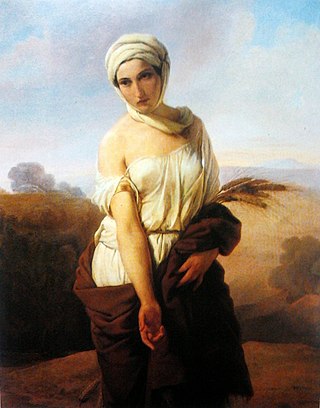
Ruth is the person after whom the Book of Ruth is named. She was a Moabite woman who married an Israelite. After the death of all the male members of her family, she stays with her mother-in-law, Naomi, and moves to Judah with her, where Ruth wins the love and protection of a wealthy relative, Boaz, through her kindness. She is the great-grandmother of David.
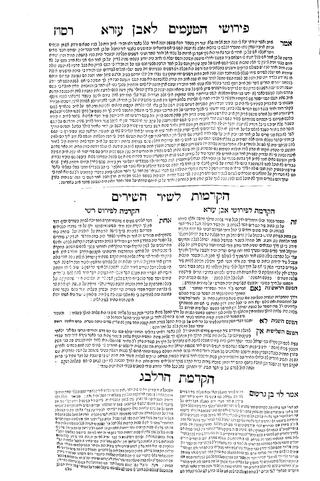
Ruth 2 is the second chapter of the Book of Ruth in the Hebrew Bible and in the Old Testament of the Christian Bible. This chapter contains the story of Ruth gleaning in the fields of Boaz, her deceased husband's near kinsman, and he notices her, Ruth 2:1-7; Boaz shows her great kindness, and blesses her, Ruth 2:8-16; Ruth brings what she got to Naomi; and tells her about Boaz; Naomi gives God thanks, and exhorts Ruth to continue in the field, Ruth 2:17-23.
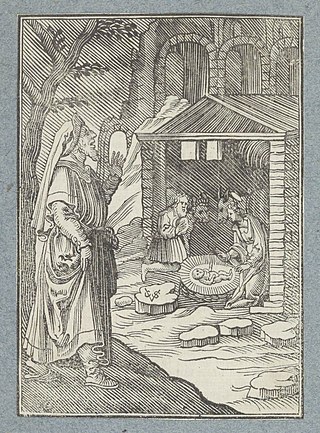
Micah 5 is the fifth chapter of the Book of Micah in the Hebrew Bible or the Old Testament of the Christian Bible. This book ostensibly contains the prophecies attributed to the prophet Micah, and is a part of the Book of the Twelve Minor Prophets.
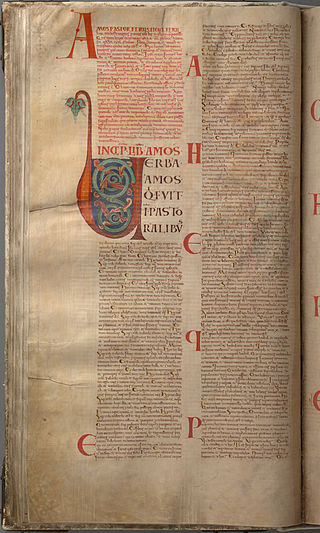
Amos 2 is the second chapter of the Book of Amos in the Hebrew Bible or the Old Testament of the Christian Bible. This book contains the prophecies attributed to the prophet Amos, especially charges against Moab, Judah, and lastly Israel, the chief subject of Amos' prophecies. It is a part of the Book of the Twelve Minor Prophets.
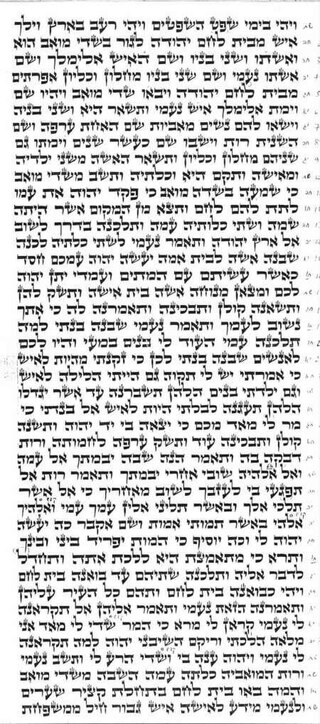
Ruth 3 is the third chapter of the Book of Ruth in the Hebrew Bible or the Old Testament of the Christian Bible, part of the Ketuvim ("Writings"). This chapter contains the story of how on Naomi's advice, Ruth slept at Boaz's feet, Ruth 3:1-7; Boaz commends what she had done, and acknowledges the right of a kinsman; tells her there was a nearer kinsman, to whom he would offer her, and if that man refuses, Boaz would redeem her, Ruth 3:8-13; Boaz sends her away with six measures of barley, Ruth 3:14-18.

Ruth 4 is the fourth chapter of the Book of Ruth in the Hebrew Bible or the Old Testament of the Christian Bible, part of the Ketuvim ("Writings"). This chapter contains the story of how Boaz goes up to the city gate, calls his kinsman; inquires whether he would redeem and marry Ruth, Ruth 4:1-5. He refuses, Ruth 4:6-8. Boaz, with the people witnessing and congratulating, buys the inheritance, and marries Ruth, Ruth 4:9-12. She gave birth to Obed the grandfather of King David, Ruth 4:13-17. The genealogy from Perez (Pharez) to David, Ruth 4:18-22.

Ezekiel 4 is the fourth chapter of the Book of Ezekiel in the Hebrew Bible or the Old Testament of the Christian Bible. This book is one of the Books of the Prophets and contains the prophecies attributed to the prophet/priest Ezekiel. In this chapter, following God's command, Ezekiel performs a sign-act, a symbolic representation of the siege of Jerusalem and resulting famine.

2 Kings 3 is the third chapter in the second part of the Books of Kings in the Hebrew Bible or the Second Book of Kings in the Old Testament of the Christian Bible. The book is a compilation of various annals recording the acts of the kings of Israel and Judah by a Deuteronomic compiler in the seventh century BCE, with a supplement added in the sixth century BCE. After a short introduction to the reign of the last king of Israel from the Omride dynasty, Jehoram the son of Ahab, this chapter records the war of the coalition of the kings of Israel, Judah, and Edom, against Mesha the king of Moab with some contribution of Elisha the prophet. Another view of the events in this chapter is notably provided by the inscription on the Mesha Stele made by the aforementioned king of Moab in c. 840 BCE.

1 Chronicles 5 is the fifth chapter of the Books of Chronicles in the Hebrew Bible or the First Book of Chronicles in the Old Testament of the Christian Bible. The book is compiled from older sources by an unknown person or group, designated by modern scholars as "the Chronicler", and had the final shape established in late fifth or fourth century BCE. This chapter focuses on the Transjordanian tribes, geographically from south to north: Reuben, Gad and the half tribe of Manasseh, as well as the account of the war against the Hagrites and the reasoning why Transjordanian tribes were taken away into exile. It belongs to the section focusing on the list of genealogies from Adam to the lists of the people returning from exile in Babylon.

1 Samuel 22 is the twenty-second chapter of the First Book of Samuel in the Old Testament of the Christian Bible or the first part of the Books of Samuel in the Hebrew Bible. According to Jewish tradition the book was attributed to the prophet Samuel, with additions by the prophets Gad and Nathan, but modern scholars view it as a composition of a number of independent texts of various ages from c. 630–540 BCE. This chapter contains the account of David's escape from Saul's repeated attempts to kill him and the massacre of the priests in Nob. This is within a section comprising 1 Samuel 16 to 2 Samuel 5 which records the rise of David as the king of Israel.
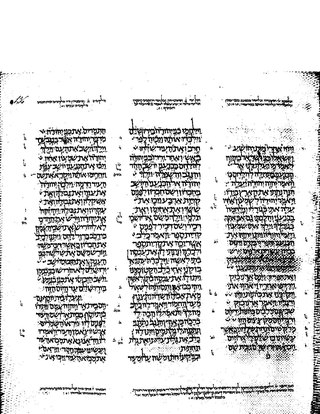
Judges 17 is the seventeenth chapter of the Book of Judges in the Old Testament or the Hebrew Bible. According to Jewish tradition the book was attributed to the prophet Samuel, but modern scholars view it as part of the Deuteronomistic History, which spans in the books of Deuteronomy to 2 Kings, attributed to nationalistic and devotedly Yahwistic writers during the time of the reformer Judean king Josiah in 7th century BCE. This chapter records the activities of Micah of Ephraim. belonging to a section comprising Judges 17 to 21.

Judges 19 is the nineteenth chapter of the Book of Judges in the Old Testament or the Hebrew Bible. According to Jewish tradition, the book was attributed to the prophet Samuel; modern scholars view it as part of the Deuteronomistic History, which spans in the books of Deuteronomy to 2 Kings, attributed to nationalistic and devotedly Yahwistic writers during the time of the reformer Judean king Josiah in 7th century BCE. This chapter records the activities of a Levite from Ephraim and his concubine, belonging to a section comprising Judges 17 to 21.
Elimelech is a biblical figure mentioned in the Book of Ruth.


















